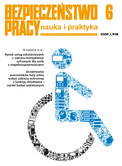Antibiotic-resistant pathogens in the occupational environment
Anna Ławniczek-Wałczyk , Rafał L. Górny
Despite the fact that antibiotic resistance is an important and growing public health problem, there is still a low awareness of the threat of drug-resistant microorganisms among the public, healthcare professionals and entrepreneurs not related to health care. It is estimated that antibiotic resistant pathogens are responsible for about 33 000 deaths in the European Union and costs more than EU 1.5 billion euros each year in terms of healthcare costs and productivity losses.
Hence, the purpose of this paper is to provide readers with an insight into the mechanisms of drug resistance, pathogenesis and spread, and to analyze available preventive measures to limit their spread in the occupational environment.
Trust vs. social and professional functioning (2). Trust at work – a resource of the highest need
Szymon Ordysiński
The second part of the article presents the results of research on the relationship of trust and work safety in an enterprise. The cited research results indicate that trust has an indirect impact on key organizational OSH factors in an enterprise, such as leadership and the safety climate, mainly by affecting employees' commitment to safety. The article also draws attention to the negative impact of trust on maintaining an appropriate level of safety in an enterprise, through the emergence of the harmful phenomenon of captainitis. The results of statistical data analyzes from publicly available studies on the relationships of trust with unsafe behaviors and actions that are inconsistent with universally binding norms and social behavioral patterns, as well as working conditions and socio-demographic features are also presented.
The need for market qualifications in the evaluation of Regional OSH Centers
Beata Taradejna-Nawrath
The act on the integrated system of qualifications has delivered a possibility to recognize qualifications acquired irrespective of the learning method. Competences gained outside the formal education system i.e. outside of school or university, more often than not have turned out to be valuable at the labour market, however they are not always precise and acknowledged. Turning them into professional qualifications (market and fragmentary) inceases market value of their holders, be them individuals or employees. Thus, the idea of learning throughout the whole life gains in importance.
The aim of the article is to show an analysis of market experiences of Regional OSH Centers in the context of possibility and legitimacy of the implementation of market qualifications related to OSH. In the article interviewees have been given voice aplenty as their numerous quotations serve to illustrate the daily state of OSH and also tell a lot on the interviewees’ feelings and many years’ experience regarding the market. Quotations shown in the article deal with new possibilities of obtaining professional qualifications while simultaneously underline the existing, old issues in the field of OSH. The most important among them are: the need to improve the learning process of professionals, better practical vocational training and the increase in the employers awareness regarding OSH.
Comparison the heat load as the results of tests on human subject in a hot environment with the results obtained from numerical simulation
Andrzej Sobolewski , Magdalena Młynarczyk , Maria Konarska , Joanna Bugajska
Comparison of the results of tests carried out in a climatic chamber with volunteers at ambient conditions: ta = 42 °C; RH = 80%; the vapor pressure = 6.56 kPa, V = 0.5 m/s; with predictions from numerical simulation made by the PHS program, they showed their satisfactory compatibility. This confirms the possibility of using the PHS program to predict the heat load of a human being in an extreme hot environment, when the vapor pressure in the surrounding environment exceeds 4.5 kPa, indicated in PN-EN ISO 7933:2005 as a limit value.





























